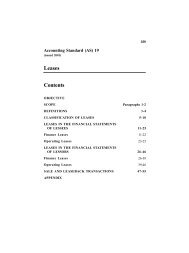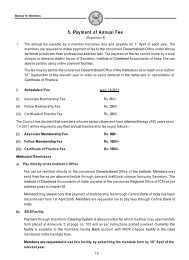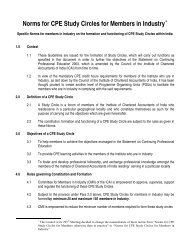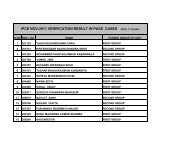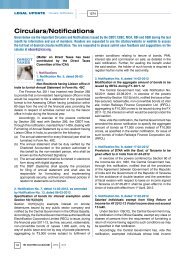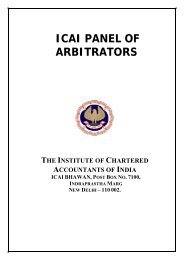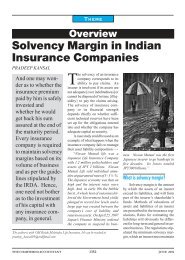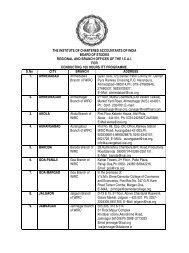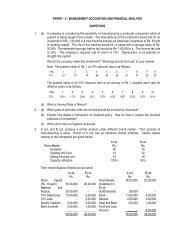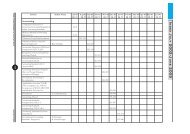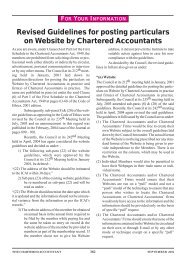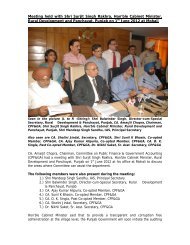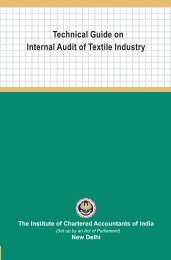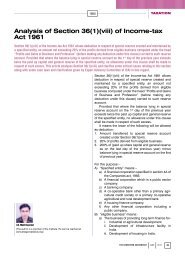The Chartered Accountant
The Chartered Accountant
The Chartered Accountant
You also want an ePaper? Increase the reach of your titles
YUMPU automatically turns print PDFs into web optimized ePapers that Google loves.
passed by the engagement letter<br />
shall be performed only on mutual<br />
agreement and with separate engagement<br />
letter.<br />
Responsibility<br />
10. <strong>The</strong> terms of the engagement<br />
should clearly mention the responsibility<br />
of the auditee vis a vis the<br />
internal auditor. <strong>The</strong> auditee is responsible<br />
for establishing, maintaining<br />
and ensuring operating effectiveness<br />
of a system of internal control.<br />
<strong>The</strong> auditee would also be responsible<br />
for timely communication of material<br />
weaknesses or other significant issues<br />
relating to internal controls, misstatements<br />
in the financial information or<br />
similar matters to its external auditors,<br />
the Audit Committee, the Board of<br />
Directors, regulators and to those to<br />
whom the auditee is required to so<br />
communicate.<br />
11. <strong>The</strong> management of the auditee<br />
is responsible for providing timely and<br />
accurate data, information, records,<br />
personnel etc., and for extending cooperation<br />
to the audit team.<br />
12. Similarly, where the internal<br />
auditor has a specific responsibility,<br />
say that arising out of a law<br />
or a regulation or a professional<br />
standard applicable to the internal<br />
auditor, to communicate directly,<br />
the above mentioned issues to an<br />
appropriate authority or someone<br />
within the entity or a regulator, the<br />
terms of the engagement should<br />
contain a clear mention of such responsibility.<br />
13. <strong>The</strong> internal auditor has the responsibility<br />
to inform the management<br />
before commencement of the<br />
assignment about the engagement<br />
team and the audit plan.<br />
Authority<br />
14. <strong>The</strong> terms of engagement<br />
should provide the internal auditor<br />
with requisite authority, including<br />
unrestricted access to all departments,<br />
records, property and personnel<br />
and authority to call for<br />
information from concerned per-<br />
STANDARDS<br />
sonnel in the organisation.<br />
15. <strong>The</strong> internal auditor should<br />
have full authority on his technologies<br />
and other properties like hardware<br />
and audit tools he may use<br />
in course of performing internal<br />
audit.<br />
Confidentiality<br />
Confidentiality of Working Papers<br />
16. <strong>The</strong> terms of engagement<br />
should be clear that the ownership<br />
of the working papers rests with<br />
the internal auditor and not the auditee.<br />
It should also be made clear<br />
that the internal auditor may, upon<br />
a request received in this regard<br />
from the auditee, provide copies<br />
of non proprietary working papers<br />
to the auditee. <strong>The</strong> terms should<br />
lay down the policy and the procedures<br />
to be followed regarding<br />
requests received for internal auditor’s<br />
working papers from third<br />
parties including external auditors.<br />
17. <strong>The</strong> internal audit engagement<br />
may also be subject to a peer review<br />
by a regulator, requiring the internal<br />
auditor to disclose his working papers<br />
to the peer reviewer without the permission<br />
of the auditee. <strong>The</strong> engagement<br />
letter should bring out this<br />
fact clearly.<br />
Confidentiality of the Report<br />
18. <strong>The</strong> engagement letter should<br />
contain a condition that the report<br />
of the internal auditor should not<br />
be distributed or circulated by the<br />
auditee or the internal auditor to<br />
any party other than that mutually<br />
agreed between the internal auditor<br />
and the auditee unless there is<br />
a statutory or a regulatory requirement<br />
to do so.<br />
Limitations<br />
19. <strong>The</strong> terms of engagement<br />
should specify clearly the limitations<br />
on scope, coverage and reporting<br />
requirement, if any. It may<br />
also mention that the internal auditor<br />
or any of his employees shall not be<br />
liable to the auditee for any claims,<br />
damages, liabilities or expenses relating<br />
to the engagement exceeding the<br />
aggregate amount of compensation<br />
agreed upon by both the parties.<br />
Reporting<br />
20. <strong>The</strong> terms of the engagement<br />
should clearly lay down the requirements<br />
as to the manner, frequency<br />
of reporting and the list of<br />
intended recipients of the internal<br />
audit report.<br />
Compensation<br />
21. <strong>The</strong>re should be a clear understanding<br />
among the internal<br />
auditor and the client as to the basis<br />
on which the internal auditor<br />
would be compensated, including<br />
any out of pocket expense, taxes<br />
etc., for the services performed<br />
by him.<br />
Compliance with Standards<br />
22. <strong>The</strong> terms of the internal audit<br />
engagement should contain<br />
a statement that the internal audit<br />
engagement would be carried<br />
out in accordance with the professional<br />
Standards applicable to<br />
such engagement as on the date of<br />
audit.<br />
Withdrawal from the Engagement<br />
23. In case the internal auditor is<br />
unable to agree to any change in<br />
the terms of the engagement and/<br />
or is not permitted to continue as<br />
per the original terms, he should<br />
withdraw from the engagement<br />
and should consider whether there<br />
is an obligation, contractual or otherwise,<br />
to report the circumstances<br />
necessitating the withdrawal to<br />
other parties.<br />
Effective Date<br />
24. This Standard on Internal<br />
Audit is effective for all internal<br />
audits beginning on or after………………………………..<br />
Earlier application of the Standard is<br />
encouraged.q<br />
THE CHARTERED ACCOUNTANT 1109 DECEMBER 2008



